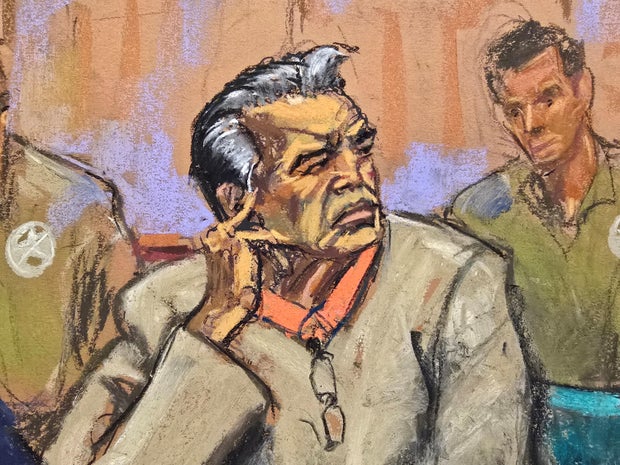U.S. prosecutors said Wednesday they were discussing a possible plea deal Ismael "El Mayo" ZambadaThe long-elusive Mexican drug lord was arrested last summer and his son is likely to testify against him if he goes to trial.
Assistant U.S. Attorney Francisco Navarro said plea discussions with Zambada, leader of Mexico's powerful Sinaloa drug cartel, have so far not come to fruition, but prosecutors hope to move forward. The judge scheduled a hearing for April 22 to get an update on the situation.
Frank Perez, Zambada's lead attorney, declined to comment on the discussion.
It is common for prosecutors and defense attorneys to explore whether an agreement can be reached, but negotiations do not necessarily lead to any progress.
Zambada was an attentive and active participant in Wednesday's hearing, which focused on whether he wants Perez to continue representing him and also a potential government witness in the case -- Zambada's son Vicente Zambada.
"I don't want to change lawyers," the father said through a court interpreter. "I want him, even though it might create a conflict if he represents me and my son."
The younger Zambada himself was charged and reached a plea deal in the United States' long-running, wide-ranging prosecution of Sinaloa cartel figures. He testified for the government in the trial of Joaquin "El Chapo" Guzman, the cartel's notorious and now-jailed co-founder.
Ismael Zambada, who worked with Guzman, kept a low profile and was thought to be more focused on the smuggling business than extreme brutality, authorities said, as a strategist and dealmaker involved in day-to-day operations who.
At Guzman's trial, Vicente Zambada recounted how his father and Guzman ran the cartel together. He once described corrupt Mexican politicians asking the group if they could help them transport 100 tons of cocaine on a tanker.
"They wanted to know if my father and El Chapo could have delivered that much coke," he told the jury in the Brooklyn federal court where his father was indicted. In another moment, Vicente Zambada recalled hearing a rival drug gang leader say he wanted to kill Ismael Zambada and Guzmán to avenge a failed attack.
Prosecutors said in a court filing last month that the son could be called to testify against his father, which could create a conflict of interest for Perez. For example, he is hampered in cross-examining his son because of his loyalty to two clients.
Defense attorneys sometimes do have potential conflicts of interest with their clients, and federal courts have outlined the steps judges should take to resolve such situations. One of these is to have an independent attorney advise defendants as they consider how to respond to possible conflicts. Zambada made the request during Wednesday's hearing.
Zambada said he realized there could be problems with Perez representing him and his son, "for example, he would have to withhold information from Vicente from me."
U.S. District Judge Brian Kogan ultimately agreed that Perez could move forward with the case, noting that Ismael Zambada had other attorneys who could handle any cases related to his son.
Law enforcement has been searching for the elder Zambada for years. Shocking arrest in July Arriving on a private plane at an airport near El Paso, Texas, with Guzmán's son, Joaquín Guzmán López. He is also wanted by US authorities.
Zambada says he was kidnapped in Mexico and dragged to the United States by Guzman Lopez, whose lawyers deny the claims. Lawyers for Joaquín Guzmán Lopez and his brother Ovidio told a Chicago court this month that they were in plea negotiations with the U.S. government.
Following the July arrest and kidnapping charges against Zambada, A terrible battle breaks out In Mexico, clashes broke out between a cartel faction loyal to him and another linked to Guzmán's son, the Chapitos.
The Chapitos use corkscrews, electrocution and hot chili peppers to torture their opponents Some victims were "fed to death," according to an indictment released by the U.S. Department of Justice.
Bodies have been turning up across Sinaloa in recent months, often dumped on the streets or in cars with any kind of object attached to them. hats on their heads Or a pizza slice or a box with a knife nailed to it. Pizza and sombreros have become unofficial symbols of the warring cartel factions, underscoring the brutality of their war.
This series of events has also strained relations between Mexico and the United States.
First, then-Mexican President Andres Manuel López Obrador and current President President Claudia Sheinbaum He placed some of the blame for the bloodshed on Washington, saying the United States had arrested unopened bottles of trouble.
Outgoing U.S. Ambassador to Mexico Ken Salazar responded by saying it was "incomprehensible" to think the cartel war was Washington's fault. He later claimed that the Mexican government had stopped cooperating with Washington to fight the cartels and turned a blind eye to violence and police corruption.
In an official note sent to the U.S. Embassy, Mexico's Foreign Ministry expressed "surprise" at the envoy's statement.
